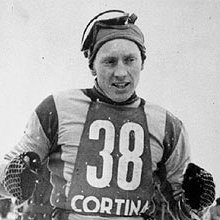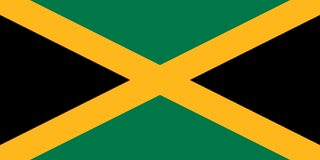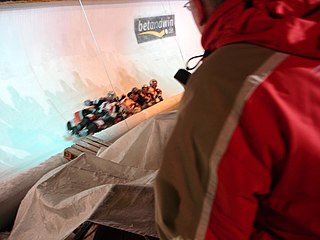
Bobsleigh or bobsled is a winter sport in which teams of 2 to 4 athletes make timed runs down narrow, twisting, banked, iced tracks in a gravity-powered sleigh. International bobsleigh competitions are governed by the International Bobsleigh and Skeleton Federation.

The 1964 Winter Olympics, officially known as the IX Olympic Winter Games and commonly known as Innsbruck 1964, were a winter multi-sport event which was celebrated in Innsbruck, Austria, from January 29 to February 9, 1964. The city was already an Olympic candidate, unsuccessfully bidding to host the 1960 Games. Innsbruck won the 1964 Games bid, defeating the cities of Calgary in Canada and Lahti in Finland. The sports venues, many of which were built for the Games, were located within a radius of 20 km (12 mi) around Innsbruck. The Games included 1,091 athletes from 36 nations, which was a record for the Winter Games at the time. Athletes participated in six sports and ten disciplines which bring together a total of thirty-four official events, seven more than the 1960 Winter Olympic Games. The luge made its debut on the Olympic program. Three Asian nations made their Winter Games debut: North Korea, India and Mongolia.

The 1976 Winter Olympics, officially known as the XII Olympic Winter Games and commonly known as Innsbruck 1976, were a winter multi-sport event celebrated in Innsbruck, Austria, from February 4 to 15, 1976. The games were awarded to Innsbruck after Denver, the original host city, withdrew in 1972. This was the second time the Tyrolean capital had hosted the Winter Olympics, having first done so in 1964.

Eugenio Monti was an Italian bobsledder and alpine skier. He is one of the most successful athletes in the history of the bobsleigh, with ten World championship medals and 6 Olympic medals including two golds. He is known also for his acts of sportsmanship during the 1964 Winter Olympics in Innsbruck, Austria, which made him the first athlete ever to receive the Pierre de Coubertin World Trophy.
The Bobsleigh 1964 Winter Olympics events took place between 31 January and 7 February 1964 at Bob und Rodelbahn Igls, Innsbruck, Austria. This marked the return of Bobsleigh to the Winter Olympics as no bob events took place at the 1960 Winter Olympics.
Victor Emery is a Canadian athlete and businessman. Emery was born in Montreal, Quebec. He is a gold medallist in the four man bobsleigh pilot from the 1964 Olympic Winter Games, as well as the 1965 World Championships.
Ingo Appelt is an Austrian bobsledder who competed from the late 1980s to early 1992.

Jamaica competed in the Winter Olympic Games for the first time at the 1988 Winter Olympics in Calgary, Alberta, Canada. They competed in one sport, Bobsledding, in both the two-man and four-man events and finished outside the medal places in both competitions. Athletes were recruited from the Jamaica Defence Force, which saw Dudley Stokes, Devon Harris, and Michael White become the first members of the team. Caswell Allen was the fourth man, but was injured prior to the start of the Olympics and was replaced by Chris Stokes, who was only in Canada to support his brother and new teammate Dudley.
Paul Aste was an Austrian bobsledder and luger who competed during the 1950s and the 1960s. He also took the Olympic Oath for athletes at the 1964 Winter Olympics in Innsbruck.
John Emery was a Canadian bobsledder who competed in the 1960s. He won a gold medal in the four-man event at the 1964 Winter Olympics in Innsbruck.
Raimund Bethge is an East German bobsledder who competed in the late 1970s. He took up the sport in 1975. He won a complete set of medals at the FIBT World Championships with a gold in four-man (1977), a silver in two-man (1978, and a bronze in four-man. He also took a silver in the European Championships in 1978 in the four-man event. Bethge also competed at the 1976 Winter Olympics in Innsbruck, finishing fourth in the four-man event and seventh in the two-man event.

The 2012 Winter Youth Olympic Games, officially known as the I Winter Youth Olympic Games (YOG), were an international multi-sport event for youths that took place in Innsbruck, Austria, on 13–22 January 2012. They were the inaugural Winter Youth Olympics, a major sports and cultural festival celebrated in the tradition of the Olympic Games. Approximately 1100 athletes from 70 countries competed. The decision for Innsbruck to host the Games was announced on 12 December 2008 after mail voting by 105 International Olympic Committee (IOC) members. Innsbruck is the first city to host three winter Olympic events, having previously hosted the 1964 Winter Olympics and the 1976 Winter Olympics.

The Olympic Sliding Centre Innsbruck is a venue for bobsleigh, luge and skeleton located in Igls, Austria. The most recent version of the track was completed in 1975 and is the first permanent, combination artificially refrigerated bobsleigh, luge, and skeleton track, serving as a model for other tracks of its kind worldwide. It hosted the bobsleigh, luge, and skeleton competitions for the 2012 Winter Youth Olympics.

The two-man bobsleigh competition at the 2010 Winter Olympics in Vancouver, British Columbia, Canada, was held at the Whistler Sliding Centre in Whistler, British Columbia on 20–21 February. The German team of André Lange and Kevin Kuske were the defending Olympic champions in this event. Switzerland's team of Ivo Rüegg and Cedric Grand were the defending world champions in this event. The test event held at the Olympic venue was won by the German duo of Thomas Florschütz and Marc Kühne. The last World Cup event prior to the 2010 Games took place in Igls, Austria on 23 January 2010 and was won by the Swiss duo of Beat Hefti and Thomas Lamparter while Rüegg won the overall World Cup in the two-man event.

The four-man bobsleigh competition at the 2010 Winter Olympics in Vancouver, British Columbia, Canada, was held at the Whistler Sliding Centre in Whistler, British Columbia, on 26–27 February. The German team of André Lange, René Hoppe, Kevin Kuske, and Martin Putze were the defending Olympic champion in this event. America's team of Steve Holcomb, Justin Olsen, Steve Mesler, and Curtis Tomasevicz were the defending world champions in this event. The test event was won by the Latvian team of Jānis Miņins, Daumants Dreiškens, Oskars Melbardis, and Intars Dambis. The last World Cup event prior to the 2010 Games place took place in Igls, Austria on 24 January 2010 and was won by the German team of Lange, Hoppe, Kuske, and Putze. Holcomb of the United States won both the four-man and the combined World Cups.
For the 1964 Winter Olympics in Innsbruck, Austria, a total of eight sports venues were used. Luge made its debut at these games, but were marred by the death of a British slider two weeks prior to the Games. A second ski jumping event debuted and the best two out of three jumps were used in both events for the only time in the history of the Winter Olympics. All eight venues would be used again when the Winter Games returned to Innsbruck twelve years later though the venues would undergo renovations in time for the 1976 Games.

For the 1976 Winter Olympics in Innsbruck, Austria, a total of eight sports venues were used. The games were originally awarded to Denver, Colorado in the United States in 1970, but they withdrew in the wake of Colorado residents voting against it for environmental and cost reasons in November 1972. This led to the International Olympic Committee opening up the bids for the games again, eventually awarding them to Innsbruck in February 1973. The Austrian city, having hosted the Winter Olympics in 1964, was in the process of having the venues used for those Games before Denver's with clear cutting of the alpine skiing venues, lessening of the amount of cross-country skiing routes, upgrading the ski jumps, adding lighting in the indoor sports arena to accommodate color television, and the construction of a combination bobsleigh and luge track. After the 1976 Games, the venues have remained in use, hosting events in Nordic skiing and the sliding sports. They hosted some of the events for the Winter Universiade in 2005 and seven of the eight venues served as host for the first Winter Youth Olympic Games in 2012.
Two-man bobsleigh at the 1964 Winter Olympics took place on 31 January and 1 February at Bob und Rodelbahn Igls, Innsbruck, Austria. This event was last run at the 1956 Winter Olympics as bobsleigh was not part of the 1960 games.











